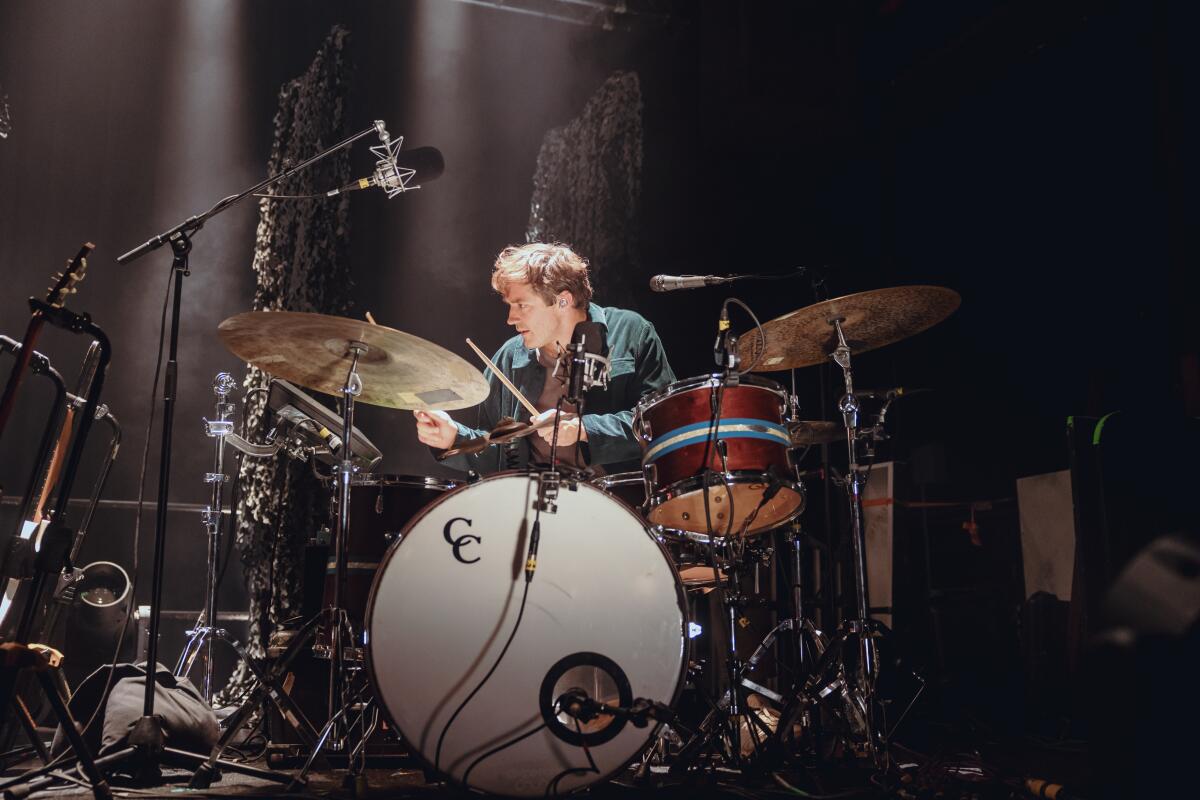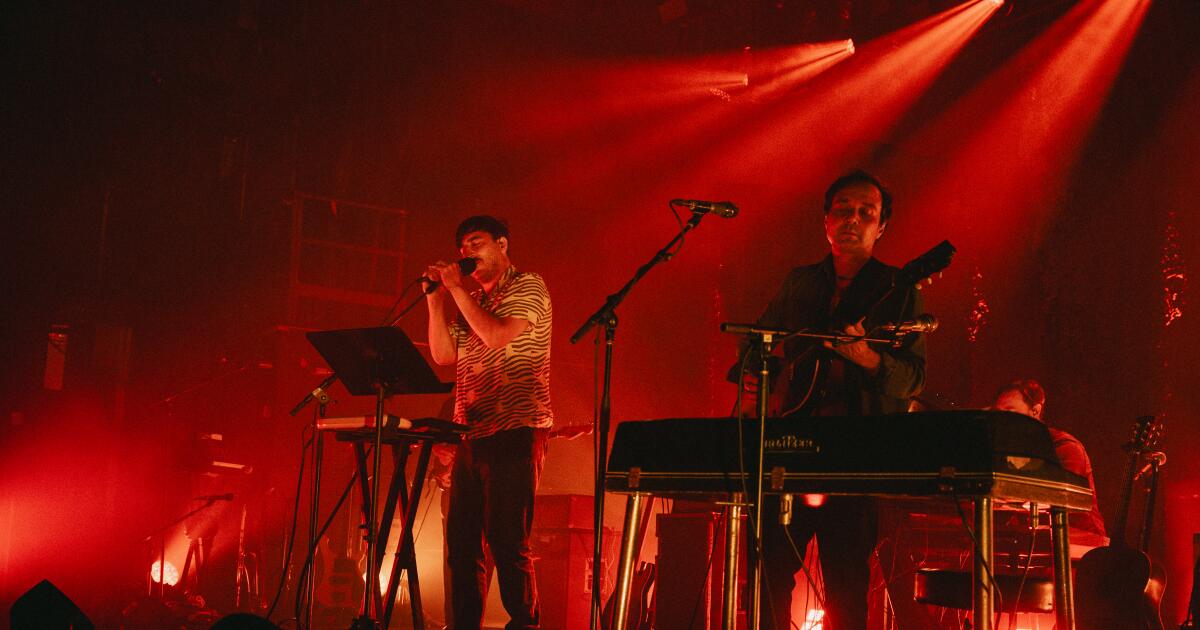Twenty years ago, Grizzly Bear emerged as unlikely torchbearers of the early-aughts indie rock boom, a moment when the genre still felt like a testing ground for young adulthood. Ed Droste, then in his early 20s, began the project alone in a Brooklyn bedroom, and as Chris Taylor (bass, vocals), Daniel Rossen (vocals, guitar), and Christopher Bear (drums) joined, their twilight psych-folk came to reflect that fragile in-between stage of postcollegiate life: a period defined by experimentation and risk, shot through with both hope and ambivalence.
After an eight-year hiatus, the members of Grizzly Bear return as middle-aged men with separate lives and evolving expectations. Playing a limited run of shows — including their first Los Angeles performance in years, on Wednesday at the Shrine — they remain open to the idea of new music, but understand they have to start where they can. For now, that means simply gathering in a room, playing songs together and feeling their way forward.
For Grizzly Bear, there’s never been a line between performance and personhood. What you see onstage is what you get: four ordinary men in plaid shirts, comfy pants and sensible shoes. Yet from their unassuming beginnings, they became unlikely architects of a movement. Once synonymous with Pitchfork at its cultural peak, Grizzly Bear embodied the moment when indie music crossed into the mainstream, when Beyoncé and Jay-Z’s presence at their 2012 show could be read as a generational shift. They’d outgrown the Brooklyn lofts where they started, landing Top 10 albums, soundtracking Super Bowl commercials, opening for Radiohead, and earning the kind of cultural cachet that briefly made indie rock feel like the center of the universe.
But at the height of success, the lifestyle of tour bus toilets, hotel room pizzas and public opinion began to take its toll. “There was never a formal breakup,” Rossen says now, his voice jumping around with nervous energy, after years away from the spotlight. “We just needed to step back, to see who else we were outside of the band.” For years, none of them seemed eager to look back.
After an eight-year hiatus, the members of Grizzly Bear return as middle-aged men with separate lives and evolving expectations.
(Caroline Safran)
It has been eight years since Grizzly Bear’s last album, 2017’s “Painted Ruins.” Over time, their lives quietly scattered. Droste — the only one who left music behind entirely — retrained as a therapist in L.A.; Rossen retreated to Santa Fe, N.M., raised a daughter, released a woodsy solo record, and collaborated with Bear on the Oscar-nominated film “Past Lives”; Bear, in turn, became a prolific film and TV composer; Taylor turned producer. The machinery of band life had run its course. “There were good reasons why we stopped,” Rossen says. “But if you have a whole catalog like that, it’s a shame to never play it again.”
Everyone in the band has their own answer for why they’ve decided to revisit Grizzly Bear. For Rossen, he says he “felt like there was enough distance from it to really start missing it,” his voice beginning to settle. “It was emotional to revisit some of that material,” he continues. “A nice thing about going back to these songs is that I felt I’d lost some of my emotional connection to them. I realized how beautiful they really were.”

Grizzly Bear bassist Chris Taylor became a producer during the band’s hiatus.
(Caroline Safran)
The decision to reunite came especially slowly for the band’s frontman. “There was a part of me that didn’t want to be opened up to criticism,” Droste admits. “I just was like, I don’t want to write and release something and then be nervous about reviews again.” Now, he says, he feels better equipped to handle it. At the same time, Droste — moving between therapy jobs — found himself with a rare opening. “The rest of the band had asked a few times over the years,” he says, his voice friendly and bright despite his initial hesitation about this interview, “but it never felt right until now.” Adding to the moment, Victoria Legrand of Beach House — one of their closest contemporaries — offered to join the shows. “That was the cherry on top,” Droste says.
The members of Grizzly Bear gathered earlier this year for eight days in a windowless soundstage deep in the Valley to rehearse. There was a teething period the first couple of days as they reconvened, trying to get back on the same page that they’d left off eight years ago. Droste spent some eight or nine hours a day singing. It was an intense reimmersion, given that Droste says he doesn’t even sing in the shower or around the house. “I sing maybe twice a year,” he says. “I hardly listen to music even.” He can’t say why. The band’s relationships to music and their own voices have changed with age: ragged choirboys as they are now, but still tuneful and beautiful.
After years apart, the band feels lighter and less freighted with expectation. “We’re able to respect each other’s boundaries now,” Rossen says. “The stakes are completely different. It allows us to be more patient with one another.” Droste’s work as a therapist has also reshaped his approach. “You can’t do that kind of work and not learn about yourself,” he says. “You get better at understanding what works for you and what doesn’t, what’s sustainable.” He laughs softly. “It’s been great. Everyone’s getting along better than we ever have.”

That sense of care carries into the logistics of their tour, too. In a moment when the road is more expensive and precarious than ever — marked by rising costs, slimmer margins, and a frazzled post-pandemic music landscape — they’ve made deliberate choices to preserve the experience: forgoing a tour bus, above all, to ensure that the spiritual reward of being onstage outweighs its physical toll.
If Grizzly Bear’s early years were about convergence — four young men building a sound that felt both communal and claustrophobic, this chapter is about calibration: finding equilibrium after a long season apart. Their set list spans their catalog but leans surprisingly on “Horn of Plenty,” those loose, bedroom-born sketches that predated any sense of grandeur. It feels fitting.
With most of the band’s members now approaching 50, they’re keen to recapture the sense of discovery and daring that once propelled them as young men, to step back into the unknown with the same restless curiosity, when creative sparks were in abundance.

Grizzly Bear drummer Christopher Bear has become a prolific film and TV composer. He collaborated with bandmate and guitarist Daniel Rossen on the Oscar-nominated film “Past Lives.”
(Caroline Safran)
They refound that feeling when they played their first shows in New York City, where it all began, in October. Back onstage, the sensory overload was total: the roar of the crowd, the strobing lights, the sub-bass rattling through their bodies. It was a marked contrast to Rossen’s current life, which is largely hermetic and domestic, confined to the four walls of his home. But a few shows in, he’s started to adjust. “It’s extreme,” Rossen says, “but it’s felt amazing to reclaim the sense that I can still function as a musician.”
Their kids have now met each other, too. Rossen’s daughter got to see him perform for the first time. “She got to understand that I don’t just make dinner or hang out at home. I actually do something out there in the world. That was great.”
For all their readjustments, Grizzly Bear remains an emblem of what indie rock once promised: that a group of thoughtful people could build something meaningful together, without needing to distort themselves to fit the market. Grizzly Bear may not have outlasted that era, but they’ve learned to come back from it on their own terms: as four regular dudes capable of creating great works of beauty, and finally, at long last, at ease with the sound.
This story originally appeared on LA Times

